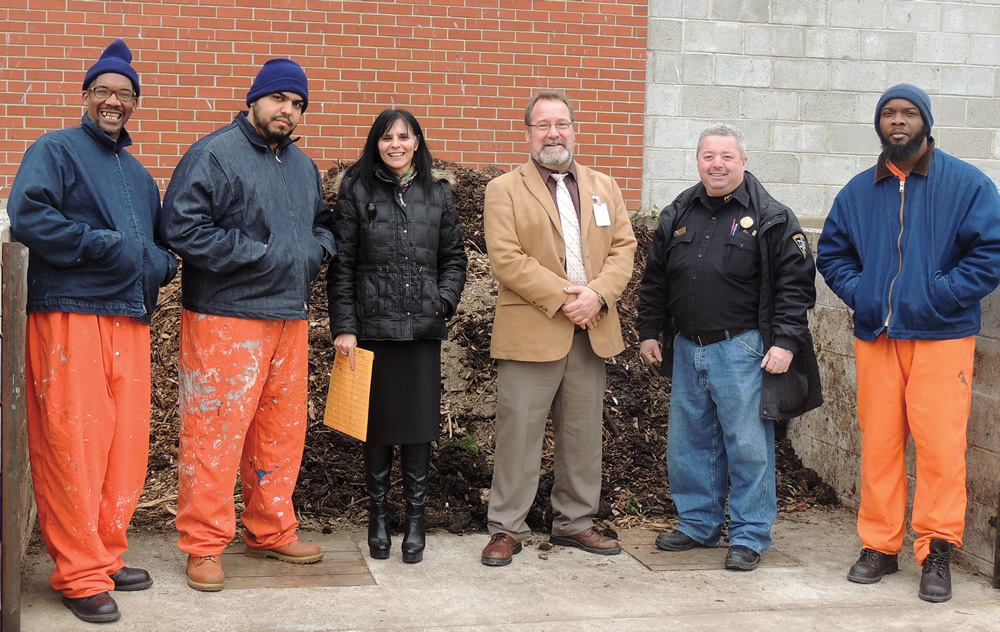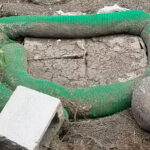An aerated bay composting system processes postconsumer food scraps from two correctional facilities — providing vocational training for inmates and compost for the prison’s orchard.
Nora Goldstein
BioCycle September 2015
On September 27th, 2015, Pope Francis will go to the Curran-Fromhold Correction Facility in Philadelphia to meet with inmates and their families as part of his visit to Philadelphia. Curran-Fromhold is one of six correctional facilities in the Philadelphia Prison System’s (PPS) complex in Northeast Philadelphia, which houses about 8,000 inmates at any one time who are awaiting sentencing or are serving sentences of less than two years.
While Pope Francis’ visit will focus on social justice issues, he likely would be interested — given his recent encyclical on climate change — in learning about the PPS food scraps composting operation, a stone’s throw away from the Curran-Fromhold facility. Located adjacent to the inactive Holmesburg facility, postconsumer food scraps from the Riverside Correctional Facility, a women’s prison that houses 800 inmates, and the House of Correction, a male prison with 1,200 inmates, are composted with wood chips in aerated bays.
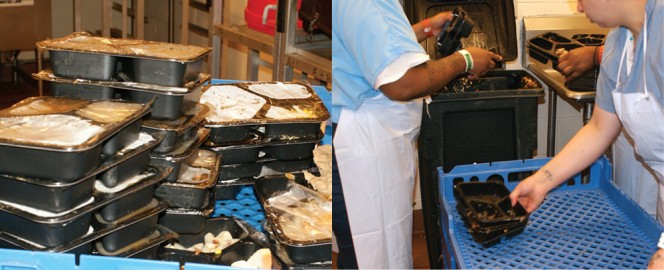
Meals are prepared in a central kitchen and delivered to prisons in the complex (left). Inmates eat in a common space in their housing area. Food remaining on returned trays is scraped into 22-gallon plastic barrels (right). Photos courtesy of Philadelphia Prison System
“We received a $15,000 grant from U.S. EPA’s Region 3 office in May 2011 to conduct a pilot, and then funds from the City of Philadelphia to expand the program,” explains Laura Cassidy, Green Program Coordinator/Project Manager and Executive Assistant to the PPS Commissioner. “Because of delays and other issues, the pilot-scale operation didn’t start up until August 2013. We added the House of Corrections to the collection program in 2014, as well as installed additional composting capacity at our site.” Cassidy came to PPS about 10 years ago from the Philadelphia Streets Department, which houses the City of Philadelphia’s curbside recycling program. One of the first things she discovered was the absence of a recycling program. At the time, the PPS was paying about $250,000/year in waste disposal fees.
Cassidy instituted single stream recycling, which made a dent in what was going to the landfill. The next target was food waste. She worked with Aramark, the foodservice contractor for PPS, to do a waste sort to assess the amount of food scraps that could be diverted. “We determined that roughly 1.4 lbs/inmate/day of preconsumer and postconsumer food waste were generated,” she recalls. “We learned about the grant opportunity through U.S. EPA to conduct a pilot, and applied in order to get a source separation, collection and composting program underway.”
Aramark runs a cook-chill food production operation with the capacity to produce 30,000 meals daily that is housed in the Curran-Fromhold Correction Facility. Those meals are delivered to the other five correctional facilities in the complex. The PPS decided to launch the pilot at Riverside Correctional Facility (RCF). “When we started the single stream recycling program, I observed that the women were better than the men at recycling, so thought it would be the best facility to start source separating food scraps,” recalls Cassidy. “The RCF is equipped with industrial-scale garbage disposals that they were running about 5 to 6 times a day — when they were working. But the units broke down a lot, so diverting food scraps to composting was more effective, and cut down on repair costs.”
Pilot Phase
Inmates at RCF eat in the common space in their housing area. Meals are delivered three times a day (breakfast, lunch, dinner). Food left on returned trays is scraped into 22-gallon plastic barrels, which are shrink-wrapped to prevent any leaking and set out on the loading dock for collection. “We originally used 32-gallon wheeled totes, which were heavy to lift, plus we had to remove the bar used for mechanical pick up of the toters for security reasons,” explains Cassidy. “We visited Waymark Correctional in Waymart, Pennsylvania to tour its composting facility, and saw they were using the 22-gallon barrels that were easier to lift when full. So we made the switch.”
The PPS opted not to line the containers to save money. Instead, the barrels are washed out at the composting site. “We have pretty stringent health inspections, so the barrels have to be washed out very thoroughly,” she adds. “That can be a challenge during the winter months.”
Cassidy notes that it took about two weeks for the inmates working in the RCF kitchen to correctly separate the food scraps from contaminants, which consist primarily of condiment packets. “Inmates are given their own utensils — a fork/spoon combination and a cup — which get sterilized,” she says. “So contamination, e.g., from disposable serviceware, isn’t a problem.” The barrels filled with food scraps are collected Monday through Friday using a box truck with a hydraulic lift. Clean barrels are left on the loading dock.
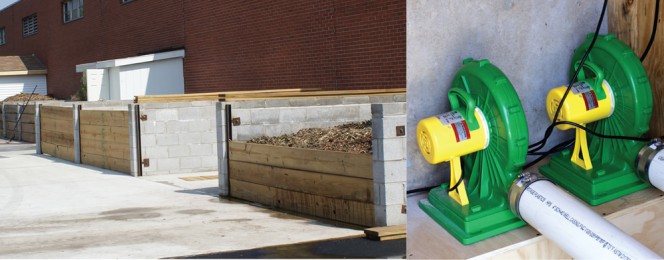
Food scraps and wood chips are composted in aerated bays (left) designed by O2Compost. Several low horsepower fans (right) service multiple bays.
The PPS selected O2Compost to design the aerated bay composting system, specify the materials needed for construction and supply the blowers, valves and timers. O2 Compost also provided a composting training manual, and offers ongoing technical support and troubleshooting. For the pilot phase, four bays, each with 12 cubic yards (cy) of capacity, were installed. The bays are 4-feet high, 10-feet deep and 8-feet wide. They were built up against the wall of the inactive Holmesberg facility. On average, about 1,100 lbs/day of food scraps are being diverted from RCF. Wood chips, dropped off by a tree trimming service, are used for amendment. A 0.5 horsepower fan is used to aerate the small bays. Air flow can be manually adjusted as the pile is being built; once complete, the fan cycles on for 2 minutes and off for 24 minutes.
“Once the pile is built, it is covered with an 8- to 12-inch layer of wood chips that act as a biofilter,” explains Officer Rick Orange, Onsite Compost Manger from the Alternative Special Detention Facility at PPS. “Our recipe for the original bays is roughly two barrels of food scraps to two wheelbarrows of wood chips.” Orange didn’t have any formal composting training, and welcomed the assistance from Peter Moon of O2 Compost. “I learned how to manage the aeration of the bays, and how to monitor the piles based on temperature readings,” he recalls.
The biggest operational challenge is keeping the aeration holes in the boards covering the aeration trenches unclogged. “Prior to starting construction of a new pile in a bay, we unplug the holes in the boards,” says Orange. “We also keep new boards with the holes already drilled to replace existing ones as needed.” Moon recommends putting a thicker layer of wood chips over the covered trenches before loading the bays to prevent fines from clogging the holes. “Some fines will go down,” notes Moon, “but we have found that the blowers provide sufficient volumes of air flow to get in and around these points.”

People involved in PPS composting (left to right): Dexter Adams, Kuldip Singh, Laura Cassidy, Lt. Edward Bender, Officer Rick Orange, and Reginald McCorey
Inmates with community custody status have been assisting with operations, including unloading the barrels, mixing in amendment, building the piles, and unloading the bays once active composting is complete. “I typically have a crew of three to four inmates, and this is usually their first exposure to composting,” notes Orange.
Once a bay is filled, material is composted for 30 to 40 days, after which the bay is emptied and compost is moved to an adjacent area for about 60 days of curing. Some finished compost is recycled back into the new piles as an inoculant. Capital costs for the composting system, and the barrels, were $15,000. The PPS maintenance staff did the construction of the composting facility, and also made a compost screener out of a recycled clothes dryer barrel.
Program Expansion
Success of the initial pilot encouraged PPS to expand the program to the House of Correction, which has an average of 1,200 male inmates who generate about 1,800 lbs/day of food scraps. Collection began in late November 2014, but was suspended during the winter due to harsh weather conditions that made it extremely difficult to wash out the barrels after emptying them. “This past winter was abnormally cold, and the water lines kept freezing,” notes Cassidy. “We were able to continue servicing the RCF. For this coming winter, we are trying to get a hoop house where we can wash out the containers.” Collection at the House of Correction resumed in March 2015.
To accommodate the additional volume, PPS received a $60,000 grant from Philadelphia Mayor Michael Nutter’s office to install four larger bays, each with capacity of 22 cy. (Each bay is 4-feet high, 14-feet deep and 11-feet wide.) Two fans aerate the four larger bays. A front-end loader is now used to mix food scraps and wood chips in a ratio of roughly 9 to 10 barrels of food scraps to one loader bucket of wood chips.
About half of the grant funds were used, so PPS is evaluating its next expansion. “We are planning to build more bays, and bring on additional correctional facilities in the complex,” says Cassidy. “For the next expansion, we will probably have to construct a free-standing wall and then build two 40-foot long bays on each side. More capital is needed to cover the costs as we will have to build a concrete pad and install a drainage system.” The anticipated cost is $80,000, but diversion to composting avoids the average landfill tipping fee of $63/ton, so the payback period is under five years.
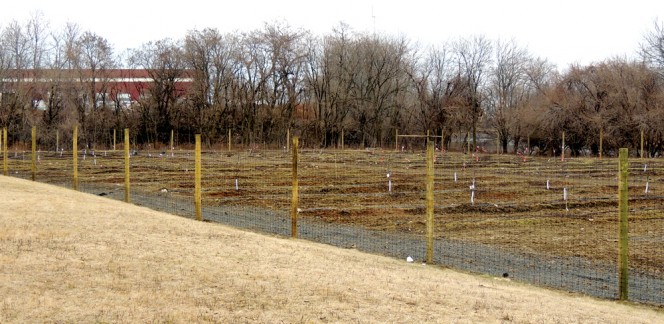
Finished compost is used as amendment in a 2-acre orchard planted with fruit-bearing trees. The orchard is behind a maximum security facility in the complex.
Finished compost originally was donated to community gardens, church groups and schools until PPS decided to install an orchard on 2 acres of property behind a maximum security facility in the complex. “Two hundred fruit-bearing trees were planted in raised beds,” says Lt. Edward Bender, who assists Cassidy with PPS’ green initiatives. “We used all the finished compost available, and still had to buy a few loads from another composting facility. We are continuing to use the compost produced as amendment in the orchard.”
Working at the composting facility, and in the orchard, provide vocational skills that can assist inmates with finding related jobs once released. The PPS has contracted with Temple University to offer a vocational certificate program in sustainability and horticulture for inmates, that builds on the skills they’ve acquired while incarcerated. One former inmate, Reginald McCorey, has been working at the composting site since operations began in 2013. “Reggie has been very dedicated,” notes Cassidy. “He worked at the site whether the temperature was 0°F or 110°F. A local composting company is interested in hiring Reggie. We think composting is an emerging field, and expect to see more jobs available to trained inmates.


